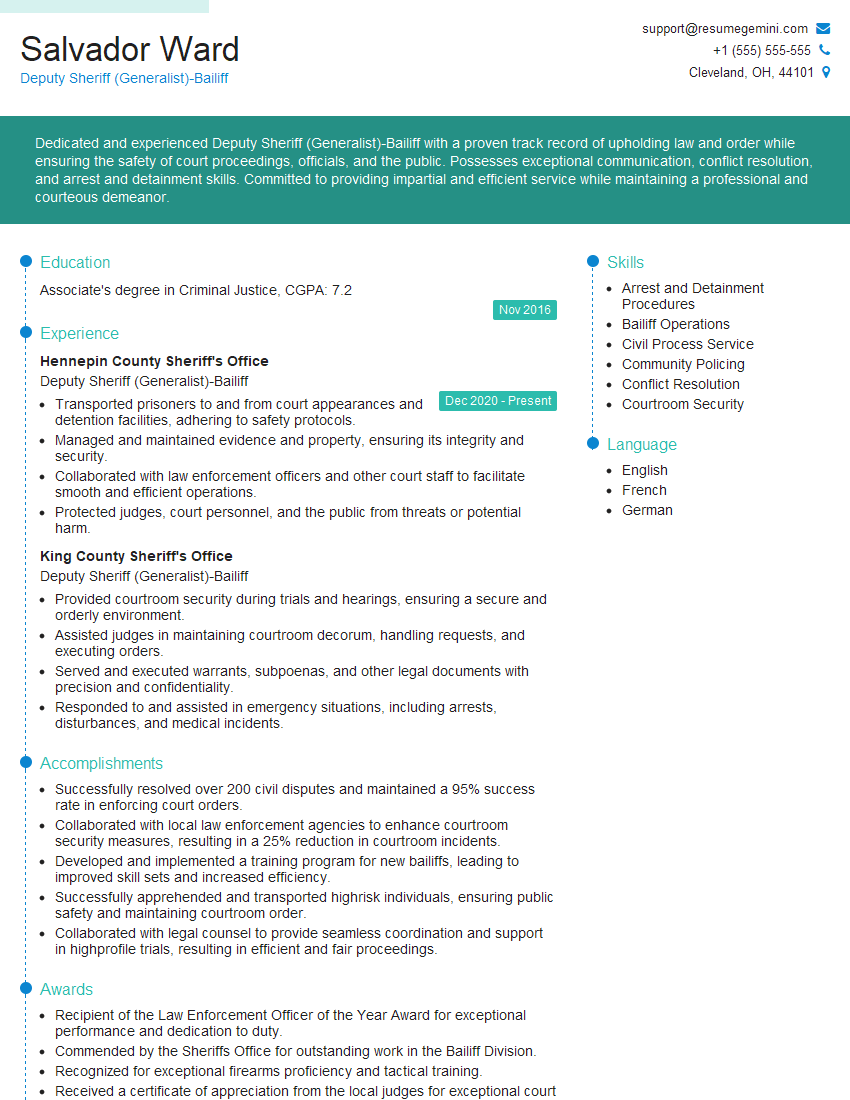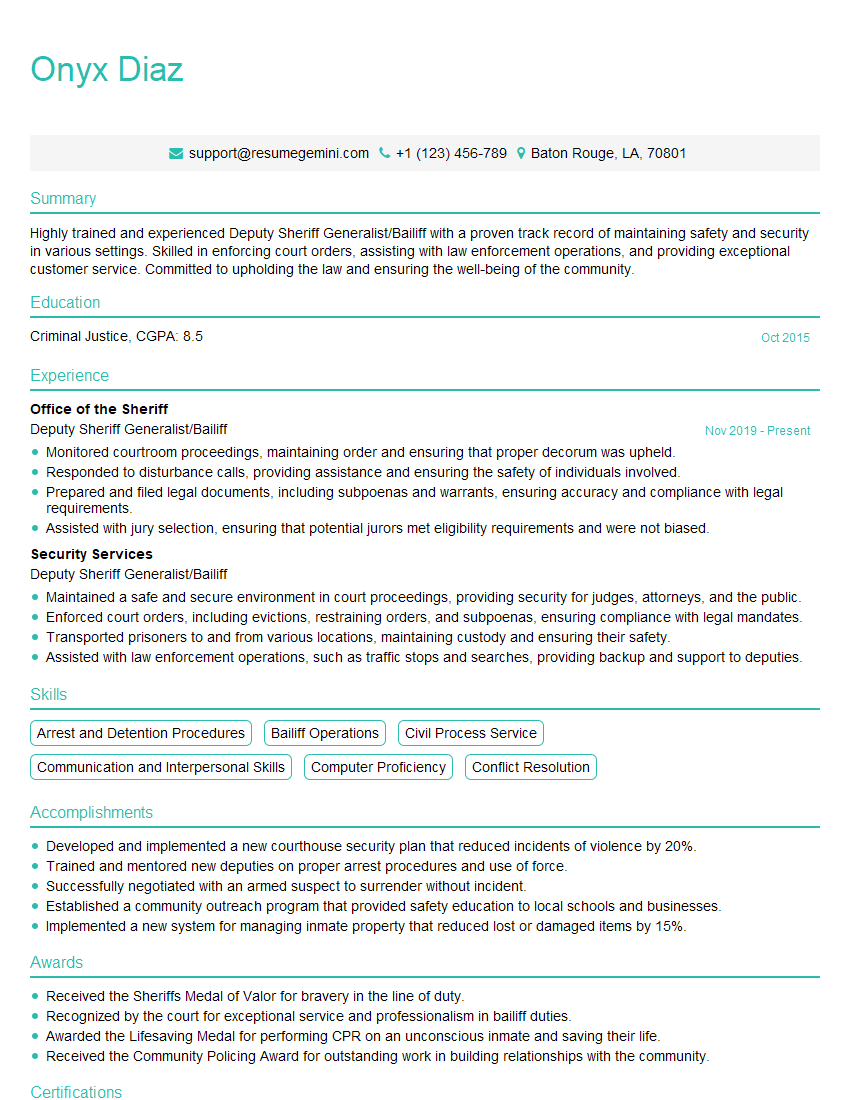Are you gearing up for a career shift or aiming to ace your next interview? Look no further! We’ve curated a comprehensive guide to help you crack the interview for the coveted Deputy Sheriff (Generalist)-Bailiff position. From understanding the key responsibilities to mastering the most commonly asked questions, this blog has you covered. So, buckle up and let’s embark on this journey together
Acing the interview is crucial, but landing one requires a compelling resume that gets you noticed. Crafting a professional document that highlights your skills and experience is the first step toward interview success. ResumeGemini can help you build a standout resume that gets you called in for that dream job.
Essential Interview Questions For Deputy Sheriff (Generalist)-Bailiff
1. What are the primary responsibilities of a Deputy Sheriff (Generalist)-Bailiff?
As a Deputy Sheriff (Generalist)-Bailiff, my primary responsibilities include:
- Providing security and maintaining order in courtrooms and other court facilities
- Transporting and securing inmates and defendants
- Serving and executing legal documents
- Providing bailiff services during trials and other court proceedings
- Assisting law enforcement officers with various tasks
2. How would you handle a situation where an inmate becomes combative during transport?
De-escalation Techniques
- Attempt to de-escalate the situation by remaining calm and speaking to the inmate in a non-confrontational manner
- Use verbal commands and body language to establish control
- If necessary, use physical restraints to subdue the inmate
Safety Precautions
- Ensure the safety of myself and any other individuals present
- Call for backup if needed
- Document the incident thoroughly
3. Describe your experience in handling courtroom disruptions.
In my previous role as a Bailiff, I have encountered several courtroom disruptions. I have learned to remain calm and composed under pressure and to take swift action to restore order.
- In one instance, a member of the audience began shouting at the judge. I quickly intervened and escorted the individual out of the courtroom
- Another time, a defendant attempted to escape during a recess. I was able to apprehend the defendant and safely return him to custody
4. How do you prioritize your tasks and manage your time effectively when working in a fast-paced environment?
In a fast-paced environment, I prioritize my tasks based on their urgency and importance. I use a to-do list or task management system to keep track of my assignments and ensure that high-priority tasks are completed first.
- I am also able to work independently and as part of a team, and I can adapt to changing priorities as needed
- To manage my time effectively, I use a variety of tools and techniques, such as setting deadlines, breaking down large tasks into smaller ones, and delegating tasks when possible
5. What are the ethical and legal considerations you must be aware of when serving legal documents?
When serving legal documents, I must adhere to strict ethical and legal guidelines to ensure that the service is valid and does not violate the rights of the person being served. These considerations include:
- Verifying the identity of the person being served
- Serving the documents in a timely manner
- Explaining the contents of the documents to the person being served
- Noting the date, time, and location of service
6. How do you maintain a professional demeanor and interact with the public in a positive manner, even in challenging situations?
Maintaining a professional demeanor and interacting with the public in a positive manner is essential to my role as a Deputy Sheriff (Generalist)-Bailiff. I understand that my actions and behavior reflect on the Sheriff’s Office, and I strive to conduct myself in a way that inspires confidence and respect.
- I am always courteous and respectful, even when dealing with difficult or hostile individuals
- I am able to remain calm and composed under pressure, and I do not allow my personal feelings to interfere with my professional duties
7. What is your understanding of the use of force continuum, and how would you apply it in your role?
The use of force continuum is a framework that guides law enforcement officers in the appropriate use of force based on the level of resistance encountered. I am familiar with the use of force continuum and have received training on how to apply it in my role.
- I understand that force should only be used as a last resort, and only to the extent necessary to control a situation
- I will always attempt to de-escalate a situation and use verbal commands and body language to gain compliance before resorting to physical force
8. How do you ensure the safety and security of witnesses and victims in court?
Ensuring the safety and security of witnesses and victims in court is a critical part of my role as a Deputy Sheriff (Generalist)-Bailiff. I take the following steps to ensure their protection:
- Escorting witnesses and victims to and from the courtroom
- Providing a safe and secure waiting area for witnesses and victims
- Monitoring the courtroom for any potential threats
- Intervening immediately if there is any attempt to harm or intimidate a witness or victim
9. How do you stay up-to-date on changes in laws and regulations that impact your role?
In order to stay up-to-date on changes in laws and regulations that impact my role as a Deputy Sheriff (Generalist)-Bailiff, I take the following steps:
- Regularly reviewing relevant laws and regulations
- Attending training and seminars
- Consulting with legal counsel when necessary
- Monitoring news and updates from the Sheriff’s Office and other law enforcement agencies
10. How do you handle situations where you must interact with individuals who have mental health or substance abuse issues?
When interacting with individuals who have mental health or substance abuse issues, I take the following steps:
- Remain calm and respectful
- Use clear and concise language
- Avoid making assumptions
- Be patient and understanding
- Call for assistance from a mental health professional if necessary
Interviewers often ask about specific skills and experiences. With ResumeGemini‘s customizable templates, you can tailor your resume to showcase the skills most relevant to the position, making a powerful first impression. Also check out Resume Template specially tailored for Deputy Sheriff (Generalist)-Bailiff.
Career Expert Tips:
- Ace those interviews! Prepare effectively by reviewing the Top 50 Most Common Interview Questions on ResumeGemini.
- Navigate your job search with confidence! Explore a wide range of Career Tips on ResumeGemini. Learn about common challenges and recommendations to overcome them.
- Craft the perfect resume! Master the Art of Resume Writing with ResumeGemini’s guide. Showcase your unique qualifications and achievements effectively.
- Great Savings With New Year Deals and Discounts! In 2025, boost your job search and build your dream resume with ResumeGemini’s ATS optimized templates.
Researching the company and tailoring your answers is essential. Once you have a clear understanding of the Deputy Sheriff (Generalist)-Bailiff‘s requirements, you can use ResumeGemini to adjust your resume to perfectly match the job description.
Key Job Responsibilities
A Deputy Sheriff (Generalist)-Bailiff is a multifaceted role within the law enforcement community, encompassing responsibilities ranging from maintaining courthouse security to assisting in criminal investigations. Here are some key job responsibilities:
1. Court Security
Ensuring the safety and orderliness of courthouses, including screening visitors, maintaining crowd control, and preventing disruptions.
- Conducting security checks and monitoring surveillance systems to identify and neutralize potential threats.
- Managing prisoner transport to and from court appearances, ensuring their safe custody and preventing escapes.
2. Bailiff Duties
Assisting judges and court personnel during legal proceedings, maintaining decorum, and enforcing court orders.
- Serving subpoenas and other legal documents to individuals and organizations.
- Summoning witnesses, maintaining custody of evidence, and ensuring the integrity of trial proceedings.
3. Law Enforcement Support
Assisting sworn deputies in various law enforcement functions, such as traffic control, suspect apprehension, and crime scene investigation.
- Patrolling assigned areas, responding to calls for service, and conducting preliminary investigations.
- Providing backup and assistance to other officers in emergency situations.
4. Community Outreach and Engagement
Representing the sheriff’s office and fostering positive relationships with the community.
- Participating in community events and programs aimed at crime prevention and public safety education.
- Engaging with residents and businesses to address concerns and build trust.
Interview Tips
To ace an interview for the position of Deputy Sheriff (Generalist)-Bailiff, consider these tips:
1. Research and Preparation
Familiarize yourself with the sheriff’s office and its specific responsibilities for the role you are applying for.
- Review the job description and identify the key qualifications and experience required.
- Research the community and its crime statistics to demonstrate your understanding of the local environment.
2. Highlight Relevant Skills and Experience
Emphasize your skills and experience in law enforcement, security, and customer service.
- Provide specific examples of how you have effectively handled conflicts, maintained order, and provided support in challenging situations.
- Showcase your ability to work independently and as part of a team, and your commitment to community engagement.
3. Demonstrate Professionalism and Ethics
Dress appropriately and arrive on time for the interview. Be respectful and courteous to the interviewing panel.
- Maintain eye contact, speak clearly, and articulate your answers concisely.
- Demonstrate your understanding of ethical principles and your commitment to upholding the law.
4. Ask Thoughtful Questions
Asking thoughtful questions at the end of the interview shows your interest in the position and the organization.
- Inquire about the specific responsibilities of the role and the opportunities for professional development.
- Ask about the department’s culture and its approach to community policing.
Next Step:
Armed with this knowledge, you’re now well-equipped to tackle the Deputy Sheriff (Generalist)-Bailiff interview with confidence. Remember, preparation is key. So, start crafting your resume, highlighting your relevant skills and experiences. Don’t be afraid to tailor your application to each specific job posting. With the right approach and a bit of practice, you’ll be well on your way to landing your dream job. Build your resume now from scratch or optimize your existing resume with ResumeGemini. Wish you luck in your career journey!

